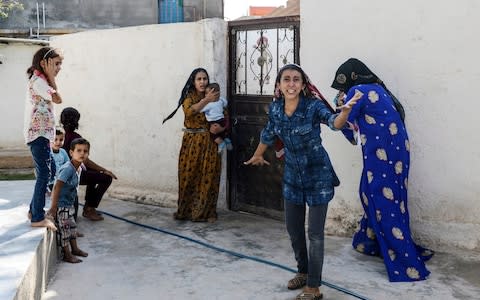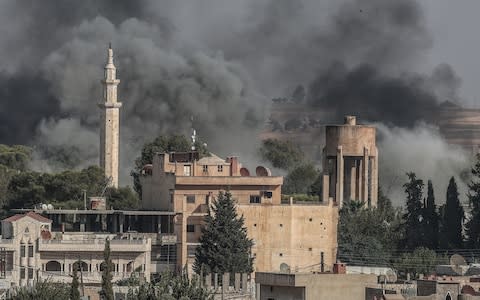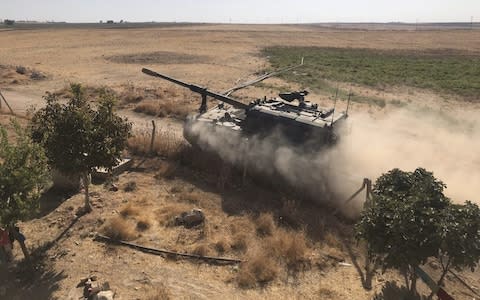Boy, 12, among casualties as Turkey intensifies assault on Kurds in northern Syria

Turkish mortars killed one 12-year-old boy and ripped off a young girl’s leg as Turkey pummeled Kurdish-held towns on the second day of its assault on northern Syria on Thursday.
Muhammad Yusuf Hussein and his 7-year-old sister Sarah were hit in a strike on Qamishli, the de facto capital of the unrecognised Kurdish statelet of Rojava.
On the other side of the border, Turkish authorities said four children including a nine-month old baby had been killed in retaliatory fire.
They were the youngest of at least 15 civilians killed in artillery and airstrikes in Turkey's bid to create a "safe zone" in a large swathe of territory controlled by the Syrian Democratic Forces, a Kurdish-led militia.
Turkey considers the Kurdish YPG, the dominant force in the SDF, to be an extension of the Kurdistan Workers Party (PKK), which has fought a decades long insurgency against Ankara and is considered a terrorist organisation by Turkey and Nato allies including Britain.
Witnesses said there was intense shelling in both directions around Ras al Ain and Tal Abyad, the two key border towns that anchor a 60-mile stretch of border where Turkey is making its main assault.
Mr Erdogan claimed 109 "terrorists" were killed in the offensive, a reference to the Syrian Kurdish fighters.
Early in the day the SDF struck a defiant note, saying they had repulsed a Turkish attack on the town of Tal Abyad and said claims Turkey had made any advance east the the Euphrates were false.
The SDF also said they had defeated attacks on villages by Islamic State sleeper cells taking advantage of the Turkish offensive.
But by late afternoon, the sheer weight and technical superiority of Turkey’s Nato-standard army was beginning to tell.
Turkish troops and allied Syrian rebel groups backed by aircraft and tanks seized key roads and villages around both cities.
“The Turks have installed themselves on the See Kanie-Hasakah road” said a SDF source, referring to the main road south of Ras al-Ain. “Attacks were carried out from three sides. Turkish planes have been striking from the air. At the same time, their heavy weapons haven’t stopped.”
The National Army, a Turkish-backed Syrian rebel group taking part in the offensive, claimed both cities were completely surrounded. The claim could not immediately be confirmed.
In a sign Bashar Assad's Russian-backed forces would not oppose the offensive, a minister described the SDF as "separatists" who had provided Turkey with a pretext for the attack.
Asked whether Damascus would resume dialogue with the Kurdish-led forces, deputy foreign minister Faisal Maqdad, rejected the suggestion and called them “armed groups who had betrayed their country and committed crimes against it.”

Turkish officials said a total of six civilians, including the children, had been killed on the Turkish side of the border.
Activists in Syria said at least 15 civilians and eight Kurdish fighters had been killed. Doctors in Tal Tamr, a Kurdish town south of Ras al-Ain, said they had seen another 10 dead and treated 25 wounded civilians, many with head or stomach injuries, since the assault began on Wednesday afternoon.
The Syrian Observatory for Human rights said at least 60,000 civilians had been displaced by fighting, with large convoys of civilian cars heading south and east away from the front lines.
Authorities said they were also struggling with a large number of displaced civilians attempting to cross the border into Iraqi Kurdistan.
One woman, who only gave her name only as Khabat, told the Telegraph she had fled the Ras al-Ain overnight on Wednesday after the shelling started. "We cannot stay here for one second of Turkish occupation. We do not want to become like the people of Afrin," she said referring to a previous offensive by Turkey on a Kurdish-majority city to the west.

She said she would first go south to Hasakah province where she had family, but was contemplating fleeing Syria altogether. "Rojava will never be safe, ever, not as long as Assad and Erdogan are in power."
Recep Tayyip Erdogan has said the goal of the operation is to "prevent the creation of a terror corridor across our southern border, and to bring peace to the area."
He has said he wants to settle Syrian Arab refugees along the border to create a buffer zone, in what critics say would be an act of ethnic cleansing.
International aid agencies warned of an escalating humanitarian crisis, saying that civilians were at risk "as violence escalates."
An estimated 450,000 people live within three miles of the border with Turkey "and are at risk if all sides do not exercise maximum restraint and prioritize the protection of civilians," a statement from 14 organizations, including Doctors of the World and Oxfam, said.
With the exception of Qatar, an ally of Ankara's, countries lined up to criticise the Turkish offensive.
French President Emmanuel Macron condenmed the assault, summoning the Turkish ambassador to Paris. "Turkey is today forgetting that the priority of the international community in Syria is the fight against Daesh and terrorism," Mr Macron said. "It is creating a humanitarian risk for millions of people."

Donald Trump, whose decision to withdraw US troops from the area earlier this week effectively gave a green light to the offensive, said he would “hit Turkey very hard financially & with sanctions if they don’t play by the rules!”
Norway, a Nato ally of Turkey, announced it was suspending all arms exports to the country.
Iran, a close ally of Syrian president Bashar al-Assad’s regime, called on Thursday for “an immediate halt” to the offensive and demanded Turkish forces withdraw.
In a rare moment of alignment with its arch enemy, Israel also condemned the assault "in the strongest terms" and offered "humanitarian assistance to the gallant Kurdish people."
"Israel warns against the ethnic cleansing of the Kurds by Turkey and its proxies," said Benjamin Netanyahu, the prime minister.
Domnic Raab, the Foreign Secretary, said he spoke to Turkish foreign minister Mevlut Cavusoglu to express “disappointment and concern” about the military incursion into NE Syria, and call for restraint. Penny Mordaunt, the former defence secretary, was more blunt.
“Bad for refugees. Bad for security. Bad for future defence. Bad for the rules based order. Bad for Nato,” she wrote of the Turkish operation on Twitter. “Good for just about every terrorist organisation and hostile state you care to name.”

